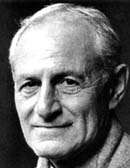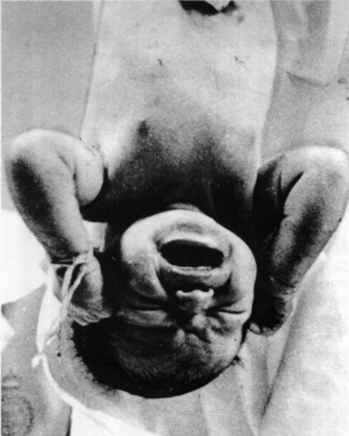|
What is the most important event that happened
in your life? Birth! Coming into this world was quite an event. Although
you don’t remember it anymore, the circumstances in which you were born
could have caused traumas that you are still carrying around, unconsciously.
People who have been regressed through hypnosis to the moment of birth have
remembered unpleasant experiences that caused psychological problems later
on in their lives.

Frederic Leboyer (see below) demonstrates
this with a letter a woman sent him when she learnt about his teachings:
"Allow me to share the following story with you. I can attest to
its authenticity, for it is about me.
I was born in 1915, on June 22.
One month later I became a ward of the state. I will pass over my childhood
and adolescence, which were exceptionally happy. Nonetheless, I often had
bad dreams at night, and one in particular, which was particularly vivid,
woke me up every time. The admirable foster-mother who raised me would then
take me into her bed and comfort me. This ghostly vision was always the
same: a middle-aged woman, wearing an old-fashioned bonnet, would reach
for my throat with such obvious intentions that I would scream ... and wake
up. This nightmare is still very vivid in my memory for the following reason:
it haunted my nights, about a dozen times a year, until I was about forty
(my husband was the one who would comfort me then).
Well, when I was
thirty-nine, without having looked for her, I found my mother again. She
explained the reason why she had abandoned me. She was unmarried, and as
soon as she confessed her "sin" to her mother, the latter flew
into a horrible rage. At the moment of my birth, in a little village near
here, she threw her daughter down off the bed and leaped onto me, trying
to strangle me. Some good neighbors, who were present, called the nuns from
the little hospital nearby, and they took us both away. Faced with repeated
threats from that irascible grandmother, my mother took me herself to the
Public Assistance office in Privas as soon as she was strong enough to make
the trip, which was a long one in those days. When I asked her what that
woman looked like, I had the (totally unexpected) surprise of recognizing,
in her description, the woman who had caused me so many nightmares.
I,
of course, have told this story to all of my children, waiting for the time
when I could speak of it to a specialist. Now it has come! I hope that this
will corroborate your thesis on the ability of the baby to feel: the already
conscious state, of a new-born baby. If it is possible for you, I would
like you to give me your feelings about my story, which is totally truthful."
The circumstances of birth were primarily determined by midwives. In Greek
and Roman times, midwives functioned as respected, autonomous care providers
to women during their reproductive cycles. Some qualifications for the practice
of midwifery began to evolve during this period. For example, in Greece
the midwife was a woman who had borne children herself. This requirement
has remained a commonality in the practice of midwifery.
The midwives
of these centuries generally continued to learn by the apprentice model.
As an apprentice, skills and knowledge were passed down from generation
to generation .
As modern medicine gained legitimacy and power toward
the end of the nineteenth century, it called for the abolition of midwifery
and home birth in favor of obstetrics in a hospital setting. In 1900, midwives
still were attending almost half of all births but was steadily declining.
Midwives were portrayed as dirty, illiterate, and ignorant, and eventually
women were convinced that they were safer in the hands of doctors and hospitals.
Midwives were effectively stamped out in the early years of the 20th century.
Physicians trained in the specialty of obstetrics and gynecology declared
themselves to be the proper caregivers for childbearing women, and the hospital
was deemed to be the proper setting for that care. Birth evolved from a
physiological event into a medical procedure.
By the 1960s women were
forced to endure labor without the presence or support from partners or
family. Infants were taken from the mother at delivery and cared for in
newborn nurseries and bottle-feeding became the norm. Any babies born outside
the sterile environment of the operating room were labeled contaminated
and kept separately.
Although modern medicine has given us many advantages
in health care, the circumstances of birth have completely changed. Fortunately
we have seen many changes in the last decades in hospitals, maternity wards,
and a growing interest in natural births, or home births, coupled with the
advantages and knowledge of modern medicine.
Why is the environment at
birth so important? As the newborn baby arrives into a new world sounds
are loud and harsh, light is blinding, and big hands are touching him all
over. The baby is very susceptible to what happens to him, and around him.
When doctors took over midwifery, this fact was totally ignored. Babies
were seen as just a part of a medical procedure. A person who shed new light
on the importance of childbirth was Frederick Leboyer.
Frederick
Leboyer, M.D. was a French physician who was responsible for creating the
awareness in maternity wards of the intact an functioning senses of the
newborn. Many doctors at the time even thought newborns to be blind at birth!
His revolutionary book "Birth without Violence" changed the way
in which many parents and professionals bring babies into the world.
When I first read Birth without Violence it opened my eyes. Birth without
Violence explores in depth the sensitivity of the newborn and the importance
of how the baby is handled by the people around him. I first read the book
after I had seen a TV program about ‘natural births’, in which Leboyer was
teaching pregnant women how they could communicate with their yet unborn
babies. He taught that the baby in the womb is able to intuitively understand
what the mother is saying, not the actual words, of course, but what she
wants. He would teach them to put their hands on their belly and tell the
baby to move upwards or downwards in the belly, and yes, after five or ten
seconds touch could clearly see that the baby did move into the desired
direction. It worked every time.
Leboyer's focus was primarily
on improving the quality of the birth experience for the baby. His message
was that a sensitive, unobtrusive style of care which is deeply respectful
of the natural process, and a peaceful atmosphere at the time of birth would
help the baby to be born with a minimum of trauma. His famous book and film
'Birth Without Violence' inspired mothers all over the world to want to
give birth naturally and in a more quiet atmosphere. Birth Without Violence
illustrates how to create an environment of tranquility in which to welcome
our children: a relaxed mother, gentle lighting, soothing atmosphere, and
a warm bath that mirrors the child’s prenatal surroundings. Dr. Leboyer’s
simple techniques demonstrate how a birth without violence has far-reaching
implications for improving the quality of human life physically, emotionally,
and spiritually.
Leboyer's book,
Birth without Violence, is available at the bookstore, it is
published by Healing Arts Press, ISBN 0-89281-983-9. It has also been
published by Publisher Cedar, ISBN 0 7493 0642 4.
|


 or
or
